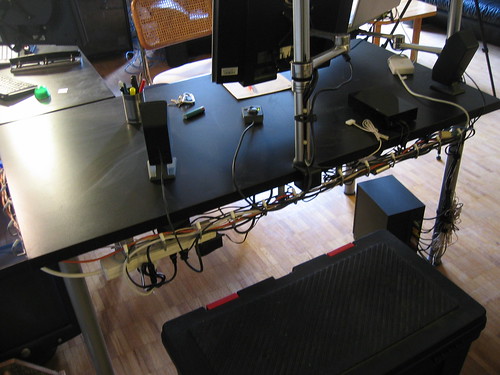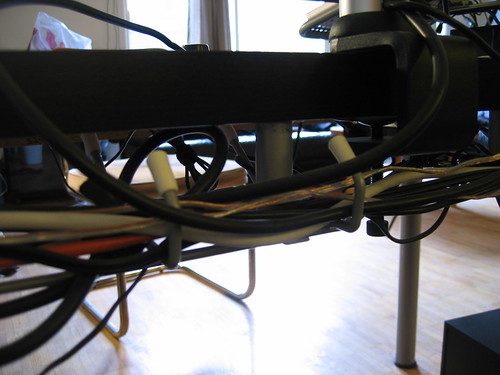Rings a bell? They are not so common nowadays and are often associated with vintage technology, except in libraries, where they very often serve the sole purpose of consulting the database. But a while ago, terminals were pretty much the only alternative to fiddling with punchcards on a mainframe. Back then, it was not possible to build a personal computer that had enough resources to do anything other than add a bunch of numbers together, or at least at a decent price and size. Displaying a text document is a very tricky task when all you have is 256 bytes of ram…
Terminals died as silicon shrunk and became more affordable; so much that by the 1980s, they had pretty much vanished as a sensible option. At the beginning of the 1990s, they made a limited come back as X-terminals, or simple computers that only run a X server and rely on a bigger UNIX machine to take care of the actual work. It was rather ephemeral, although most Linux users still get to enjoy the venerable X.org as their windowing system.
A few days ago, I came across a quite interesting article by wired. To make a long story short, it explains how netbook sales will very soon pass notebook sales, mostly because of their relatively lower price tag, that they make perfect internet workstation, and that third world citizens can almost afford them. It does make a lot of sense if you look at what people use their computers for: Facebook, surfing, Facebook, e-mails you get from Facebook, Facebook, chat with Facebook, music, Facebook, movies, Facebook, pr0n, Facebook and the occasional word processing. Basically, they rely on the internet for most of what they do and the programs they use, beside a browser, tend to be very lightweight. The story becomes different if you add games to the equation (although nowadays, most use consoles), but in short you don’t need a 2999$ alienware 20 inch, Quad Core, SLI, RAID 0 laptop that you keep on a table anyway because its too big and heavy and overheats, to do that (Facebooking). I suppose that segment of the portable computer market will gradually shift towards being niche as the trend reverses itself, where pure power used to push sales, it is now size and affordability, so much that the crowds who used to thrive on multigigahertz monsters, now find the concept of netbooks quite convenient for day-to-day computing.
It totally makes sense from an economical perspective for people to buy netbooks, but what about terminals? Well, if you think about what I previously said, it seems netbooks fit perfectly the case of terminals, where the web is the mainframe, and your browser a window to it. There is very little you cannot do online, google docs, Facebook, chat, music, movies, everything is there, even image processing, the rest of the activities concern only 5% of all users. You said games? Well, AMD has a rendering farm in the works. Imagine playing World of Warcraft on the bus, wow! The wired article does bring up that point; that things are shifting. Shifting back to what they used to be: terminals. But this time, different terminals, and at-times, terminal will probably be used as a relationship rather than a moniker to describe hardware, like client-server. Kevin Kelly entertained the TED crowd with a very insightful talk, about the next 5000 days of the web, that was all about the concept of that new kind of terminal. To describe the relationship between personal computers and the web, he stated that personal computers would only be windows to the “One”, or terminals looking inside the immense machine that is the web. However, as parts of the web, they would also be looked into by other terminals, thus making “terminal” a relationship.
While I will not dig further into futurology, the perspective of that one big web really excites me. But what I am wondering, is if that terminal versus standalone time function is not periodic. If software will not become once again so demanding, that it will no longer be possible to distribute it until the network catches up. As with all things, time will tell.





